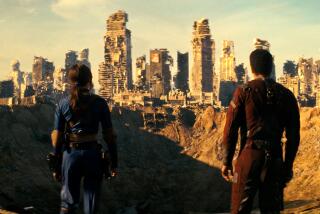Why the ‘Westworld’ premiere’s post-credit surprise could be the show’s silver bullet
- Share via
“Westworld” has only just returned, and HBO’s complex sci-fi drama is already messing with viewers. Sunday night’s Season 3 premiere introduced a new, sanitized version of the West — Los Angeles, circa 2058 — as a backdrop for the ongoing robot revolt. It stayed in that slick, tumbleweed-free zone for 99% of an episode that appeared to forfeit a critical aspect of the show’s success: the collision between technology and nostalgia. Then came a swift and powerful post-credits scene that harked back to the warped romanticism of the show’s beginnings.
There wasn’t a player piano in sight during the premiere episode, only sleek high rises and hovercraft. It was an abrupt departure from the fantasy themes left behind in Season 2, which ended in a puzzling finale nearly two years ago. That too featured a hard drive-frying post-credits scene. The only sure message in its cryptic ending was that technology was overtaking the folks it was meant to serve and that we’re all screwed. Stock up on provisions and stay tuned.
“Westworld” Season 3, on HBO, is set in Los Angeles in the 2050s. The series’ creative team explains why it doesn’t look like “Blade Runner.”
As “Westworld” returns, it’s set predominantly in future Los Angeles. MacArthur Park — not a theme park simulating the Old West — is the backdrop. Flying cars have replaced horses, and Dolores’ (Evan Rachel Wood) billowing prairie frock and windswept locks have given way to a deadly black cocktail dress and an I-mean-business blowout.
The city is sleek, clean, ruled by algorithms: Boy, is it boring.
The tension of high-tech “hosts” like Dolores placed in simulated, old-timey environs, when electricity was still a pipe dream, was half the draw of the series when it debuted in 2016. A sort of back-to-the-future thing, in reverse, or something ... hard to say since confusion is all part of the game with “Westworld.”
What was clear? The delicious irony that humans used their most advanced technology to re-create a simpler time, then corrupted that world as well.
Dolores, Maeve (Thandie Newton) and the rest of the park’s sex toys were programmed to fulfill the horrific whims of depraved guests, until the robots turned on their masters. Season 2 ended in a great massacre, and killing machine Dolores breached the park’s borders to lead the takeover of humankind. Bernard Lowe/Arnold (Jeffrey Wright) and the Man in Black (Ed Harris) were no longer themselves, and that was supposedly going to mean something moving forward.
Despite the addition of Aaron Paul, Season 3 looked a lot less intriguing, exporting many of those terrors out of the park and into the big city, where a Coach store lines Dolores’s kill path.
Then the credits rolled and another narrative was dropped in the mix: World War II-era Europe. Maeve is shown for the first time since last season, brought back online in a new loop in Nazi-occupied Italy. She awakes in 1940s period clothing and God, it’s fabulous: a deep red skirt suit, her hair Lana Turner glamorous. Oh, and there’s the gun in her hand, a bloody corpse on the floor and (presumably) a terrified soldier, stripped of his uniform, bound and gagged in a chair.
“Westworld,” HBO’s divisive sci-fi drama, can confuse even the most astute viewer. But what if the frustration that causes is exactly the point?
She ignores his pathetic whines and opens the windows of the villa into a town square that’s crawling with enemy troops. A flag emblazoned with a swastika hangs on the outside of a church, signaling a new loop for Maeve, and a new fresh hell for viewers to deconstruct — or throw up their hands and watch “Friends” reruns, because nothing good happens when the Third Reich is involved.
A new war spun off an old war: The mind-bend continues. “Westworld” can’t survive in a world that looks too much like our own. Few watch for the labyrinthine story alone. Be it Jesse James’ era or one of the ugliest chapters in modern history, re-creating notions of how it was — or wanted it to be — is this show’s superpower.
‘Westworld’
Where: HBO
When: 9 p.m. Sunday
Rating: TV-MA (may be unsuitable for children under the age of 17)
More to Read
The complete guide to home viewing
Get Screen Gab for everything about the TV shows and streaming movies everyone’s talking about.
You may occasionally receive promotional content from the Los Angeles Times.







